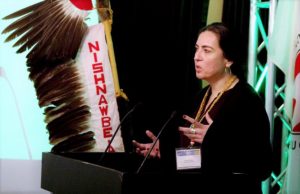Tanya Talaga delivers keynote presentation stressing Indigenous health issues on global-scale

By Rick Garrick
THUNDER BAY—Award-winning journalist Tanya Talaga stressed the common health issues affecting Indigenous people around the world during her Jan. 22 keynote presentation at the Nishnawbe Aski Nation (NAN) Health Summit in Thunder Bay.
“The Indigenous experience in all of those colonized nations that I mentioned is startlingly the same,” Talaga says, noting Indigenous nations located in Australia, Brazil, Canada, New Zealand, United Stated and the Arctic circle. “It is an experience marked by the separation of people from the land, the separation of families, the separation of individuals from traditional ways of life.”
Talaga, whose grandmother is from Fort William, noted the existence of residential schools in Australia, Canada, Norway and the United States and the practice of taking Indigenous children away from their parents and families and placing them in foster care far away from their homes, families and culture.
“All of these historical actions have impacted on the children’s spirits, for instance, pride of knowing who they are and where they belong,” Talaga says. “When children are born into adversity and into communities without clean water or proper plumbing, with unsafe housing, parents suffering from addictions and traumas, or have to leave their communities to access health care or to access education, basic rights easily obtained by other children in this country, or they do not have a parent to tuck them in to bed at night or to tell them that they love them, children die.”
Talaga was invited by former National Chief Ovide Mercredi, health transformation lead and negotiator with NAN, to share some of her insights during the Health Summit, held Jan. 22-24 at the Best Western Plus NorWester Hotel and Conference Centre.
“The key points [of my presentation] were the importance of working together, all nations, both here in northern Ontario, throughout Canada and even beyond, because there is far more that unites than separates,” Talaga says. “The Sami [in northern Norway] are doing something really interesting through the SANKS (Sámi National Centre for Mental Health and Substance Use) program — they are delivering their own model of traditional care. They have Sami-trained health professionals and therapists, they treat in their own culture, in their own language. Their view is you just can’t treat the child, you also have to treat the parents because if you just treat the child you are often sending them back to a situation that is not good for them in the first place.”
Talaga says Dr. Michael Kirlew in Sioux Lookout, located about 400 kilometres northwest of Thunder Bay, often calls it the “doughnut of care.”
“It’s like a circle — you have to surround that child with care and the parents and the family,” Talaga says. “Wouldn’t that be incredible if we could have models of care like that here?”
Talaga appreciated the response her presentation received from the people at the Health Summit.
“A woman from Alaska came up to me and thanked me for the presentation,” Talaga says. “The one thing people were saying is that unity is very important, sticking together and making decisions that benefit everyone, all communities. And I would say broaden it, almost make it international because there is strength in numbers.”
Talaga also stressed the importance of Senator Murray Sinclair’s message of doing things for ourselves.
“We have to do things for ourselves,” Talaga says. “I think that is the number one message. It is an easy message, it is a simple message, easy to understand, sometimes hard to do, but it has to be done.”

